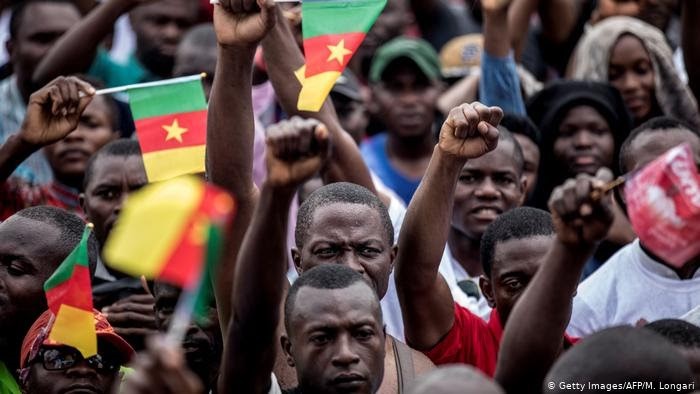Amnesty International Calls For Release Of 160 Opposition Members Detained In Cameroon

Amnesty International (AI) has called for the release of all opposition members currently in detention centres on the order of Cameroonian authorities.
The human rights organisation said the recent arbitrary detentions and prosecutions of opposition members in military courts in Cameroon was a crackdown by the Paul Biya led Government on opposition members.
In a report released on Thursday, AI called the actions taken on the opposition as the latest example made by the Cameroonian authorities on dissenting voices which began a few months ago in September.
According to the report, no less than 500 people from the opposition Movement for the Renaissance of Cameroon (MRC) had been arrested since September 22.
Out of the 500, 160 remain detained, 13 have been sentenced to prison by civilian courts and 14 appearing before military reports, Amnesty International reported.
Fabian Offner, Amnesty International’s West and Central Africa researcher called on the Cameroonian authorities to immediately release all those detained.
“The authorities must immediately put an end to the mass arbitrary arrests and detentions and immediately release prisoners of conscience,” Offner said.
“The harsh repression of opposition and dissenting voices shows no sign of relenting in recent months. People simply exercising their right to freedom of peaceful assembly and demonstration have paid a high price with prison terms based on trumped-up charges.”
According to the report, protests had been slated by the MRC in towns across Cameroon but were ultimately banned by the authorities, which in turn led to many of the arrests made and detaining many of the supporters of the opposition.
Lawyers in the towns of Doula, Yaounde, Bafoussam and Nkongsamba have filed 45 applications for the release of at least 160 people that were arrested as of November 25. Each application has been rejected.
Eight people who have been found guilty for “gathering, assembly and public demonstrations and rebellion in groups” have been sentenced to two years in prison, while five others were sentenced to four months for attempting a public demonstration, Amnesty said.
The use of military courts has also been a major cause for concern in the cases made against the opposition members.
AI said 14 people were arrested and prosecuted for attempted insurgency and public demonstration and gathering in Bafoussam West between the 24th and 25th of November.
One of them was also prosecuted for “contempt to the President of the Republic” and for holding “two signs calling for the departure of President Biya’’.
Others also arrested on September 22 were convicted on a number of other charges including “attempted revolt”, “rebellion”, “aggravated assembly” and “lack of national identity card’’ by the Yaoundé military court, placing them in pre-trial detention.
Olivier Bibou Nissack, Maurice Kamto’s spokesman, and Alain Fogue Tedom, national treasurer of the MRC were amongst those detained.
Dozens of women including the president of the MRC women’s group Awasum Mispa Fri were also arrested and charged by a military court with “complicity in revolution and rebellion”.
This was after they made the call for the opposition leader, Maurice Kamto’s house arrest to be ended. It was later lifted on December 8.
“Military courts should in no way be competent to try civilians as reminded in the guidelines and principles on the right to a fair trial of the African Commission on Human and People’s’ rights,” said Offner.
An MRC member who spoke to Amnesty International said, “The Directorate of Territorial Surveillance (DST) agent slapped and punched me in the face.”
He also said he was tortured and suffered other forms of ill-treatment during interrogation, which took place with the presence of a lawyer.
He was afterwards detained for two months and five days at another site without any means of communicating to the outside world, and without being taken to court before a judge.
After being released, he returned to the DST after being summoned by the DST. He stated that after refusing to unlock his phone, an officer handcuffed him and tied his arms and feet.
“He asked me if I am an MRC member… If I voted in the last election… if I took part in the protests… Then told me I was stirring up rebellion. Again, he told me to unlock my phone, I refused, and he slapped and punched me at the face….,” he said.
“Later policemen handcuffed my hands behind my back. I got into the back of a pickup, and was taken to another area, still handcuffed like a bandit. I was searched, they took down all my identification documents, and put me in a windowless room, with mosquitoes, and no drinkable water. This is where I spent over two months…. ”
Offner said such acts of torture carried out by the DST agents should be “impartially and independently investigated”.
“Those responsible should be prosecuted and punished,” he added.
Support Our Journalism
There are millions of ordinary people affected by conflict in Africa whose stories are missing in the mainstream media. HumAngle is determined to tell those challenging and under-reported stories, hoping that the people impacted by these conflicts will find the safety and security they deserve.
To ensure that we continue to provide public service coverage, we have a small favour to ask you. We want you to be part of our journalistic endeavour by contributing a token to us.
Your donation will further promote a robust, free, and independent media.
Donate HereStay Closer To The Stories That Matter




